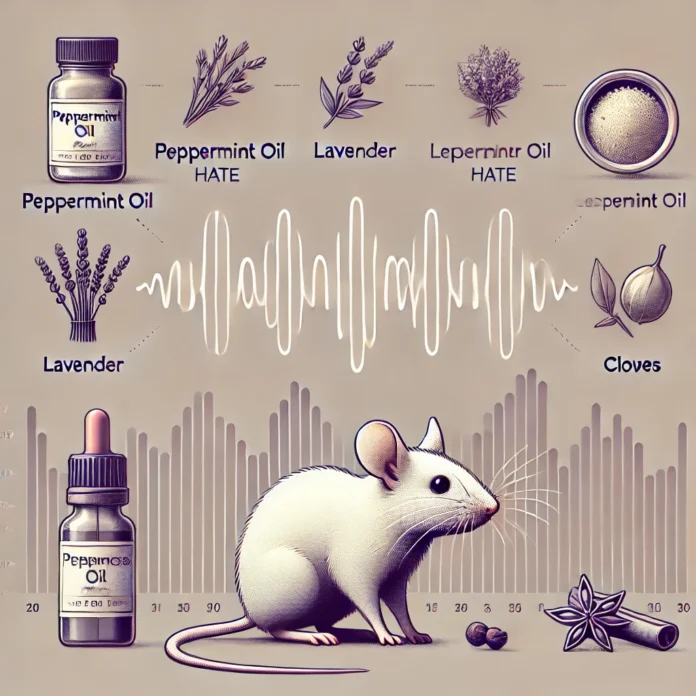Many people reach for traps, poisons, or expensive professional pest control when dealing with a mouse infestation. But there’s a more natural and potentially safer way to handle this problem—understanding what smells mice hate. By decisively utilizing specific smells, you can keep mice under control without turning to cruel synthetic substances or exorbitant medicines. In this guide, we’ll dive into the smells mice find repulsive and how you can use them to protect your home.
The Power of Smell: Mice’s Sensitivity to Odors
Mice have an extraordinary sense of smell, 40 times more sensitive than humans. This sharp sense of smell assists them with exploring, tracking down food, and distinguishing risk. Interestingly, this same sensitivity makes them particularly sensitive to certain odors, making these smells highly effective for keeping mice away from your home.
Understanding which smells mice hate is a natural way to deter them. By leveraging these smells, you can create an environment that mice find uncomfortable, making your home less attractive for them to nest or forage.
Peppermint Oil: A Natural, Fresh Solution
Peppermint oil is one of the most widely known and recommended smells that mice hate. The strong, minty scent overwhelms mice, who find it irritating and unpleasant. This smell disrupts their ability to communicate and navigate, which is why peppermint oil is often used as a natural deterrent.
The most effective method to Utilize Peppermint Oil to Repulse Mice
- Peppermint Oil Spray: Blend 10-15 drops of peppermint oil with water in a shower bottle. Shake well, and spray it around areas where mice are known to enter your home, like windowsills, entryways, and baseboards.
- Cotton Balls: Douse some cotton balls in peppermint oil and spot them where mice will probably be, such as behind furniture or near holes and cracks.
Peppermint oil can be highly effective when used consistently, although it may need to be reapplied every few weeks as the scent fades.
Eucalyptus: A Strong Smell That Mice Can’t Stand
Another powerful smell that mice detest is eucalyptus. The firm, medicinal aroma of eucalyptus leaves is effective at repelling rodents. Just like peppermint, eucalyptus oil disrupts mice’s sensory systems, making them uncomfortable in areas where the smell is prevalent.
How to Use Eucalyptus Oil to Keep Mice Away
- Essential Oil Diffusers: Utilize a medicinal balm diffuser to scatter eucalyptus oil throughout your home. Place it close to section focuses like entryways and windows.
- Eucalyptus Oil-soaked Cotton Balls: Like peppermint oil, soak cotton balls in eucalyptus oil and strategically place them around your home.
Eucalyptus is often regarded as one of the most potent natural deterrents for rodents, making it an excellent addition to your mouse prevention strategy.
Garlic: A Natural Mouse Repellent
While we humans enjoy the savory aroma of garlic, mice find it unbearable. The pungent odor of garlic is a major turnoff for mice, and using garlic in your home can act as a natural repellent.
How to Use Garlic to Repel Mice
- Garlic Cloves: Crush a few garlic cloves and place them in areas where you suspect mouse activity. The pungent smell will discourage mice from staying around.
- Garlic Spray: Blend garlic cloves with water to make a garlic-infused spray. Use this spray on surfaces or areas where mice may enter your home.
Garlic is a cost-effective, natural repellent that can help deter mice without resorting to harmful chemicals.
Cloves: A Spice Mice Despise
Cloves are another powerful scent that mice can’t stand. The firm, spicy smell of cloves disrupts mice’s ability to smell food and find shelter. Mice generally avoid areas heavily scented with cloves, making them a valuable tool in your mouse-repellent arsenal.
Read About: Study Guide | Of Mice and Men PDF with Analysis & Quotes
How to Use Cloves to Keep Mice Away
- Whole Cloves: Place entire cloves in mesh bags or small containers and set them in places where mice are likely to enter.
- Clove Oil Spray: Similar to peppermint oil, you can make a spray by mixing clove oil with water. Spray it in high-risk areas, such as along your foundation or near potential entry points.
While cloves have a strong fragrance, they are typically safe for households with children or pets.
Ammonia: A Harsh Smell That Mice Avoid
While not a natural odor in the same sense as the essential oils and spices we’ve discussed, ammonia is another smell that mice strongly dislike. The pungent, chemical scent mimics the smell of predator urine, making mice instinctively avoid areas where it is present.
How to Use Ammonia to Repel Mice
- Ammonia-soaked Rags: Place rags or cotton balls soaked in ammonia in areas where mice enter your home. The smell will drive them away quickly.
While ammonia can be effective, it’s essential to use it cautiously. It may be unsafe when breathed in enormous amounts. Make certain to keep it away from youngsters and pets.
Cinnamon: A Sweet-Smelling Deterrent
Cinnamon is a pleasant spice for humans and a smell that mice find highly irritating. The firm, spicy aroma disrupts their senses and keeps them from getting comfortable in your home.
How to Use Cinnamon to Repel Mice
- Cinnamon Powder: Sprinkle cinnamon powder around baseboards, window sills, or entry points. The smell will linger for a while and discourage mice from settling in.
- Cinnamon Sticks: Place whole cinnamon sticks in areas where you’ve noticed mouse activity. This is a simple and effective method for keeping your home mouse-free.
Cinnamon is a protected and regular option compared to compound anti-agents, making it ideal for families with pets or little kids.
FAQ: Common Questions About What Smells Mice Hate
How long do the smells last before I need to reapply them?
The effectiveness of these smells diminishes over time, and they may need to be reapplied every 1-2 weeks, depending on the scent and how quickly it dissipates in the air.
Can these smells be used around pets?
While most of these smells are safe for pets in small amounts, it’s always best to consult a veterinarian, especially if pets are prone to chewing or sniffing strong-smelling substances.
How do I know if mice are in my home?
Droppings, bit materials, settling regions, and scratchy commotions around evening time are indications of a mouse invasion. If you notice these signs, it’s time to take action.
Is peppermint oil the most effective deterrent?
Peppermint oil is one of the most popular and effective natural deterrents, but its effectiveness can vary. For optimal results, it’s best to use a combination of repellents.
Can these smells attract mice to my home instead of keeping them away?
No, these smells are unpleasant to mice and act as deterrents. However, it’s essential to ensure no food sources attract mice into your home.
Conclusion: Natural Deterrents That Work
Mice are highly sensitive creatures, and by using the right smells, you can create an environment that repels them naturally. Peppermint, eucalyptus, garlic, cloves, and even ammonia are all effective deterrents, offering a safer, non-toxic way to keep your home mouse-free. These natural solutions can be a key part of your pest control strategy, working in harmony with good hygiene and proper sealing of entry points.
Remember, consistency is key. Regularly refresh these smells, and you’ll make your home an unattractive place for mice to settle. You can enjoy a rodent-free home without resorting to harmful chemicals by using natural remedies that mice hate.


